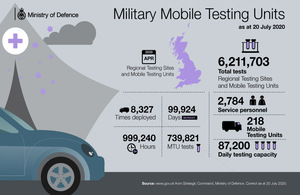The Queen praises FCO staff for COVID-19 work at virtual visit
Her Majesty The Queen praised the ‘incredible work’ of FCO staff responding to the coronavirus pandemic during a virtual visit and portrait unveiling.
The Queen saw the painting being unveiled via a video call on Friday afternoon, the first time a portrait of a Member of the Royal Family has been unveiled virtually.
The artwork – commissioned by the FCO and painted by winner of the 2018 BP Portrait Award, Miriam Escofet – will be proudly on display in the refurbished reception of the new Foreign, Commonwealth and Development Office.
During the visit, Her Majesty talked to staff who worked around the clock to repatriate British nationals who struggled to get home due to lockdown measures around the world, and also heard about work the UK Government is doing internationally to develop a vaccine.
During the virtual visit, Her Majesty The Queen said:
It sounds as though everybody in the FCO has been doing the most incredible work. I must say I’m very impressed to hear about it. >
On the portrait itself, The Queen said:
I’m glad I’ve had the chance to see it. I hope I’ll see it in real life one day.
Sir Simon McDonald, Permanent Under Secretary and Head of the Diplomatic Service at the Foreign and Commonwealth Office, said after the visit:
We are honoured to have Her Majesty The Queen see this unique portrait unveiling and hear about FCO’s vital work responding to the coronavirus pandemic, getting British travellers home and working with other countries to develop a vaccine.
Her Majesty The Queen is our best diplomat. This beautiful new portrait is a tribute to her lifetime of service and we’re glad our many visitors will see it for years to come.
Portrait artist Miriam Escofet said:
It was a huge honour to paint a portrait of Her Majesty and to join The Queen to unveil the portrait virtually. I wanted the portrait to capture Her Majesty’s humanity, her radiance and her warmth, which came through so strongly in the two portrait sittings.
Further information
*Follow the Foreign Office on Twitter @foreignoffice and Facebook
*Follow the Foreign Office on Instagram, YouTube and LinkedIn
